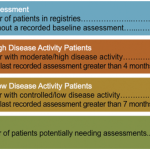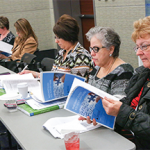In an interview with The Rheumatologist, J. Larry Jameson, MD, PhD, discusses the benefits and complications of precision medicine for rheumatologists and their patients, including advances in genetics, diagnostic tools and targeted treatments…


In an interview with The Rheumatologist, J. Larry Jameson, MD, PhD, discusses the benefits and complications of precision medicine for rheumatologists and their patients, including advances in genetics, diagnostic tools and targeted treatments…

The ICD-10 page on the Centers for Medicare & Medicaid Services (CMS) website features a countdown clock that shows the time left until Oct. 1, 2015, the date on which compliance with the new code set becomes mandatory. By the time this issue goes to press, the clock will read 90 or fewer days. Time…

Christopher Adams, MD |
Editor’s note: This is the second installment of a two-part series showing how a busy office-based practice can incorporate patient advocacy into its standard workflow. In Part 1, we looked at the reasons for incorporating patient advocacy into your practice and offered an outline for implementing it. Part 2 amplifies the concepts explored in Part…

Full implementation of ICD-10 will go live on Oct. 1, 2015, and congressional leaders have confirmed there will be no further delays. The transition to ICD-10 is not just a simple update; it is a major revamping of diagnosis coding. With the complexity of coding using the ICD-10 system and the high risk of disruptions…

Eric Butterman |
There can be a rhythm to rheumatology. At least that’s what Alain Alvarez, MD, can sometimes find. Listening, assessing, helping. It can be a successful dance when doctor and patient become partners, hoping to lead each other forward. When you consider this, it might be little surprise that Dr. Alvarez is also a dance teacher….
Kathryn Doyle |
(Reuters Health)—Many doctors, nurses, midwives and physician assistants come to work sick even though they know it puts patients at risk, a new survey hints. Many said they don’t call in sick because they don’t want to let colleagues or patients down by taking a sick day, and they were concerned about finding staff to…

Erin Arnold, MD, William Arnold, MD, Douglas Conaway, MD, Gary Crump, MD, Edmund LaCour, MD, James Mossell, DO, Glen Parris, MD, Kathleen Thomas, DO, David Sikes, MD, Anne Winkler, MD, PhD, MACP, Timothy Harrington, MD, & James Bower, MPA |
Rheumatologists have growing concerns about how we manage rheumatoid arthritis (RA) and the disease outcomes we are achieving.1 Over the past two years, clinician rheumatologists have begun working together to address these problems through the Rheumatoid Arthritis Practice Performance (RAPP) Project, a nationwide clinical quality-improvement initiative. The RAPP Project has now grown to 168 participants…

At this year’s ACR/ARHP Annual Meeting in San Francisco, you can take advantage of a variety of sessions designed to address pressing concerns in practice management today. Practice managers, clinicians, office staff and others will enjoy and benefit from hands-on practical sessions and informative panel discussions by top content experts in the field. Here are…

Christopher D. Adams, MD |
Editor’s note: This is the first installment of a two-part series showing how a busy office-based practice can incorporate patient advocacy into its standard workflow. Part 1 outlines the reasons for advocacy and the benefits to both patients and doctors, then gives a quick-start outline to get you started. Part 2 will amplify the concepts…

Studies suggest that physicians rate between 10 and 15% of patient visits “difficult.”1 This is important for a variety of reasons: Patient satisfaction is a frequently measured parameter, and poor interactions may lead to bad ratings. Personal satisfaction on the part of the provider is also an issue, and frustrating interviews can leave the physician…